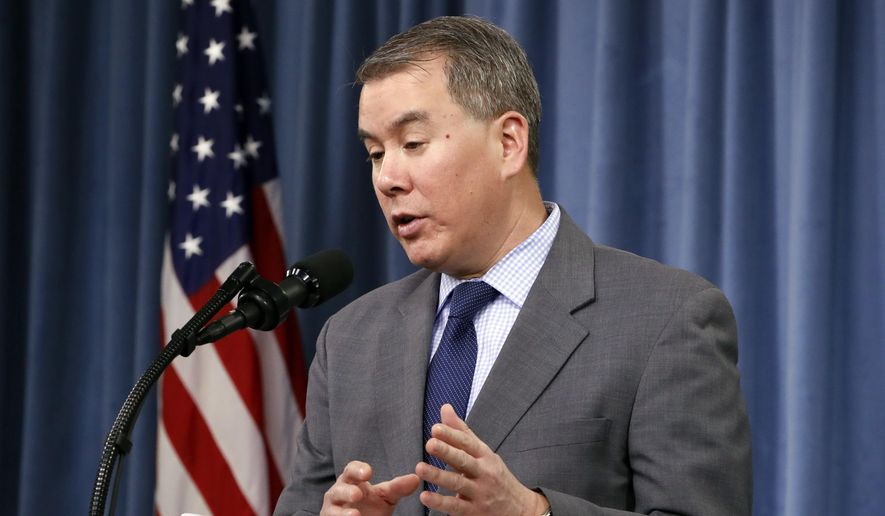The Pentagon’s top policy official was pushed out of his job Wednesday at the direct request of President Trump, marking the latest senior defense official to leave his post in the last six months amid tensions over the extent of White House influence in military affairs.
John C. Rood, who has served as the Pentagon’s under secretary of defense for policy since January 2018, formally resigned Wednesday, effective at the end of the month. Mr. Rood, a former Lockheed Martin executive who previously held posts at the State Department and Capitol Hill, signed off on the military aid package to Ukraine in early 2019 that became the central pillar in Mr. Trump’s subsequent impeachment trial.
Mr. Rood’s resignation came amid reports of clashes with other top foreign policy officials inside the Pentagon and at the White House.
Mr. Trump said little other than to wish Mr. Rood well.
“I would like to thank John Rood for his service to our Country, and wish him well in his future endeavors!” Mr. Trump tweeted.
But in his resignation letter, Mr. Rood made clear that Mr. Trump actively sought to remove him from the position.
“It’s my understanding from Secretary Esper that you requested my resignation …,” reads the letter, a copy of which was obtained by The Washington Times. “Senior administration officials appointed by the President serve at the pleasure of the President, and therefore, as you have requested, I am providing my resignation effective February 28, 2020.”
James Anderson, the acting deputy under secretary of defense for policy, will take over Mr. Rood’s duties.
The departure is just the latest management challenge for Mr. Esper, who like a number of Cabinet secretaries has struggled to keep both his boss in the White House and the huge bureaucracy he leads at the Pentagon happy.
Mr. Rood’s resignation comes just weeks after Mr. Trump also fired Lt. Col. Alexander Vindman, the top Ukraine expert at the White House’s National Security Council. Lt. Col. Vindman testified in the House’s impeachment proceedings on the president’s notorious July 2019 phone call with Ukrainian President Volodymyr Zelensky. Mr. Trump has openly hinted he expects the Pentagon to deal with Lt. Col. Vindman’s conduct.
Mr. Rood’s departure also marks at least the sixth top Pentagon official to step down over just the past six months, creating another major gap in the Defense Department’s leadership structure.
More broadly, however, analysts say the incident underscores Mr. Trump’s willingness to involve himself in the inner workings of the military, and to act when he feels his priorities are not being addressed.
In addition to moving billions of dollars once again from Pentagon projects to fund his U.S.-Mexico border wall, the president also faces allegations that he directly intervened in the military’s “war cloud” contract, pushing the Defense Department to award the $10 billion, 10-year deal to Microsoft rather than Amazon Web Services.
Mr. Trump has a long-running feud with Amazon CEO Jeff Bezos and has frequently attacked the company. The Pentagon has denied that the president played any role in the contract process, but Amazon has filed a lawsuit and is seeking a sworn deposition from Mr. Trump.
Last November, the president also intervened directly in a number of military judicial proceedings, in particular the case of Navy SEAL Chief Special Operator Edward Gallagher, who was convicted of posing with the corpse of an Islamic State fighter but was acquitted of murder and other serious charges. The clash over the SEAL’s treatment ultimately led to the firing of Navy Secretary Richard Spencer, who went on to go public with his criticisms of Mr. Trump’s intervention and its possible effect on military discipline and morale.
Much like Attorney General William Barr — who in recent days has bemoaned Mr. Trump’s willingness to insert himself into Justice Department matters — top military leaders simply must accept that this is the way the president does business, analysts say.
“This is the president. He speaks out on anything that he feels he wants to and is not constrained by potential legal problems or notions about customary practice,” said Mark Cancian, senior adviser at the Center for Strategic and International Studies and a former official in both the Defense Department and White House Office of Management and Budget.
Mr. Rood’s resignation underscores how officials can often run into problems with Mr. Trump without even realizing it. Mr. Rood was deeply involved in certifying that Ukraine was worthy of receiving military aid and had made necessary internal political reforms to justify getting it.
The White House quietly put a hold on the aid, with Mr. Trump saying he still was not convinced Ukraine had made genuine progress. His call to Mr. Zelensky as the aid was still in limbo set in motion the events that led to his impeachment by the House and acquittal by the Senate.
• Mike Glenn can be reached at mglenn@washingtontimes.com.
• Ben Wolfgang can be reached at bwolfgang@washingtontimes.com.




Please read our comment policy before commenting.